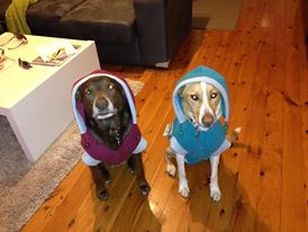 Twin Snowy Mountainerriers
Twin Snowy Mountainerriers Call it like it is.
Ever wondered why commercial puppy breeding businesses have attracted the name puppy farms, mills and factories? That's how they are run: mass produced with efficiency.
Efficiency means achieving maximum productivity with minimum wasted effort or expense.
- Efficient use of space (smallest, easily maintained spaces for maximum production),
- Efficient use of staff (least number and wages for maximum output e.g 5 full time staff, 5 casual staff for 1500 puppies a year, 300 breeding bitches and 50 breeding dogs),
- Mass quantities produced,
- Fast and high turnover.
Businesses need to make a profit and keep expenses down. The following practices are often not adopted as they do not reduce costs:
- Vet checks, medical care and genetic checks of parents.
- Resting a bitch and not breeding her each time she is in season.
- Keeping puppies for 8 - 10 weeks to avoid problems later in life in preference to moving them on at 4 - 6 weeks.
- Socializing, training and housing puppies in a home environment.
- Housing adult breeding parents in a home environment.
Many puppy farms are registered and provide the minimum legal requirements. These minimum requirements may not meet the dogs' health, social and psychological needs. Many puppy farms advertise their produce as being "ethically bred". What they mean by this is rarely explained and how they actually breed is far from ethical.
The factory/mill/farm is a primary producer and seldom sells direct to the consumer as this is not cost effective. The other pressing reason is that if the consumer saw how the puppies were produced, they wouldn't be so keen to buy.
The product is contracted out or sold in bulk to a secondary producer.
Are yah hearing me?
The dog has become a mass produced commodity at the expense of the dog and the consumer.
 Reluctoparty Happy Hound
Reluctoparty Happy Hound The prices of dogs from a large Australian on-line store which only advertises Designer Dogs is from $1295.00 to $1895.00. Using the average price of $1595.00 and 1500 puppies per year (figures supplied by puppy farm supplier), the on-line store would turn over almost $2.5 million. That’s just selling the produce from one puppy farm. It's a small business (defined by the small number of employees) with a good turnover.
How is the consumer exploited?
A beagle cross can be adopted from a refuge for an adoption fee. This is set to cover the cost of vet care, desexing, housing and feeding until a home is found. This doesn't really cover costs and the refuge relies further on donations, fund raising, volunteers and government grants.
Change the name to "Beagalier" and you can ask an extra $1000 or more (on-line retail price $1495). Shipping is usually extra. You have just marketed a cross breed for a pedigree price! Actually, that's even more than many pedigrees.
A labrador cross isn't as fetching as the sound of a "Cavador" (Labrador crossed with a King Charles Cavalier Spaniel). Would one be willing to pay an estimated retail price of $1895 for a labrador cross?
In conclusion.
With so many existing dogs (both cross breeds and pedigree) waiting for forever homes, and so many others euthanized, this is my opinion;
I find it amoral to mass produce dogs, develop catchy "designer" names in order to increase consumer demand and price and then transport them nationwide for sale.
I used amoral instead of immoral deliberately.
 Wide-eyed Rudolph-O-Dog
Wide-eyed Rudolph-O-Dog "Lacking a moral sense; unconcerned with the rightness or wrongness of something."
I'll reiterate here that abiding by minimum requirements to keep an animal alive and breeding is not the same as providing an environment that causes no harm. Nor does it necessarily provide an environment where a dog can flourish. The law should not be confused with ethics.
I hope this blog series has educated and raised concern about where our puppies come from and the ethical issues that surround their production and sale. I encourage you to look a little deeper and do your own research when the time comes to select a new furry, family member. The action of every individual has the power to influence the conditions in which dogs are bred. Consumer demand drives the wheels of supply. If consumers demand humane practices or walk away, puppy suppliers will need to comply to keep in business.
Video on how Designer Dogs are farmed ABC 7.30 Report on Designer Dogs (Youtube)
Transcript and original video (on right) of the ABC 7.30 Report on Designer Dogs
Where puppies come from - Animals Australia
RSPCA on puppy farms
The maker of the Labradoodle regrets his creation
The links I provide contain valuable information but do not imply that I agree with all content in its entirety.




 RSS Feed
RSS Feed